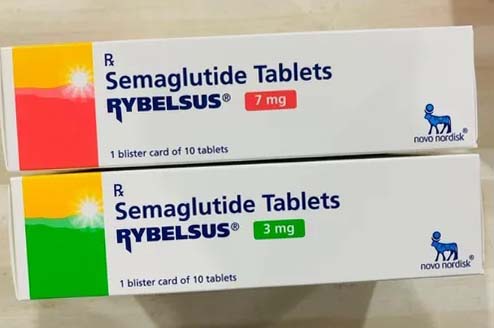BREAKING! U.S. FDA Study Discovers That Diabetics Taking GLP-1 Receptor Agonists Drugs Have Higher Risk Of Acute Cholecystitis And Death!
Source: Drug News - GLP-1 Receptor Agonists Drugs Sep 05, 2022 3 years, 5 months, 1 week, 4 days, 8 hours ago
Drug News: Medical researchers from the U.S FDA have discovered that diabetics taking glucagon-like peptide-1 (GLP-1) receptor agonists drugs like exenatide, dulaglutide, semaglutide and lixisenatide have a higher risk of developing acute cholecystitis and even higher risk of death!

The study team conducted a detailed meta-analysis from data of the of U.S FDA's reporting system for adverse events or FAERS and alarmingly found that more than 3 dozen cases of acute gallbladder disease including 3 recent deaths among patients taking glucagon-like peptide-1 (GLP-1) receptor agonists for diabetes or weight loss.
According to the study team, data from from 2005 to 2016, postmarketing cases of acute cholecystitis were identified in 21 patients taking exenatide (Byetta), in seven taking dulaglutide (Trulicity), in seven on semaglutide (Ozempic), and in one patient taking lixisenatide (Adlyxin).
The researchers warned that this could also be the tip of the iceberg as many doctors and physicians are not even aware of the discovered correlation between glucagon-like peptide-1 (GLP-1) receptor agonists and acute cholecystitis and hundreds and even thousands of cases could have been unreported and never covered by any
Drug News.
The study findings were published as a research letter in the peer reviewed journal: JAMA Internal Medicine.
https://jamanetwork.com/journals/jamainternalmedicine/article-abstract/2795476
Lead researcher Dr Daniel Woronow, MD from the U.S.FDA offices and laboratory at Silver Spring, Maryland told Thailand
Medical News, “Thirty of the cases were treated with cholecystectomy and two resolved with ursodeoxycholic acid treatment and discontinuation of the GLP-1 receptor agonist. Of the three patients who died, two had pancreatitis and one died from fatal liver necrosis.”
According to the study team, in 42% of the cases, patients experienced disease onset within 90 days from the time of treatment initiation.
The documented case series complements results of a recent meta-analysis of 76 randomized trials that detected an association between cholecystitis and GLP-1 receptor agonists.
https://jamanetwork.com/journals/jamainternalmedicine/article-abstract/2790392
The study team reported that "potential mechanisms include weight loss, suppression of cholecystokinin secretion, and reduced gallbladder emptying."
The study team noted that prescribing information in the United States for these products has recently been revised to include warnings and precautions about this risk, based on the "mechanistic plausibility," along with the small-yet-consistent imbalances of acute gallbladder events in placebo-controlled trials of GLP-1 receptor agonists and the current series from the FDA Adverse Event Reporting System (FAERS).
The study team explained that at the time of initial drug approval, only some GLP-1 receptor ag
onists for glycemic control in type 2 diabetes carried warnings about the risk for acute gallbladder disease, while others did not.
In order to assess the risk in the latter group of agents in the class, the study team conducted an analysis of FAERS to look for cases of acute cholecystitis linked to GLP-1 receptor agonists starting from the time of the first approval in 2005 through 2016.
Altogether, 36 cases of acute cholecystitis were identified based on pathology reports, diagnosis by a healthcare provider, or compatible signs and symptoms treated with cholecystectomy. Excluded from the analysis were patients with cholelithiasis or cholecystitis prior to use of a GLP-1 receptor agonist, or cases where an alternative cause of cholecystitis was suspected.
The study team found that nine patients had weight loss before their diagnosis (mean 7.6 kg or 16.8 lb) in cases where the weight loss was recorded). Two patients were also receiving fenofibrate, which comes with a labeled warning of cholelithiasis.
The median patient age was 55, and 53.1% of the cases involved women. Thirty-three of the patients were taking the drugs for type I or II diabetes, with the remaining taking the drug for weight loss. Overall, 21 patients were overweight or obese, 19 had hyperlipidemia, six had non-alcoholic fatty liver disease, and one had periportal fibrosis.
It was found that fourteen of the cases were in patients who received the recommended starting dose of GLP-1 receptor agonist, another 14 were in those on the maximum recommended dose, four were receiving a dose somewhere in between, and the dose was unknown in the other cases.
Interestingly, time to disease onset was shorter in those on the starting dose compared to patients on the maximum recommended dose (mean 49 days vs 16 months, respectively).
The study team acknowledged limitations to the analysis, including the potential for underreporting in FAERS, along with differences in product marketing times and market shares.
The researchers warned that more could have been affected and many more could have died as a result of underreporting.
Possibly due to the influence of the big pharma, the findings were not released in any press conferences by the U.S FDA nor was the study published as an actual study in the journals but rather it was published as a mere research letter that never got to catch the attention of any mainstream media or wire agencies or medical news sites!
For the latest
Drug News, keep on logging to Thailand
Medical News.
